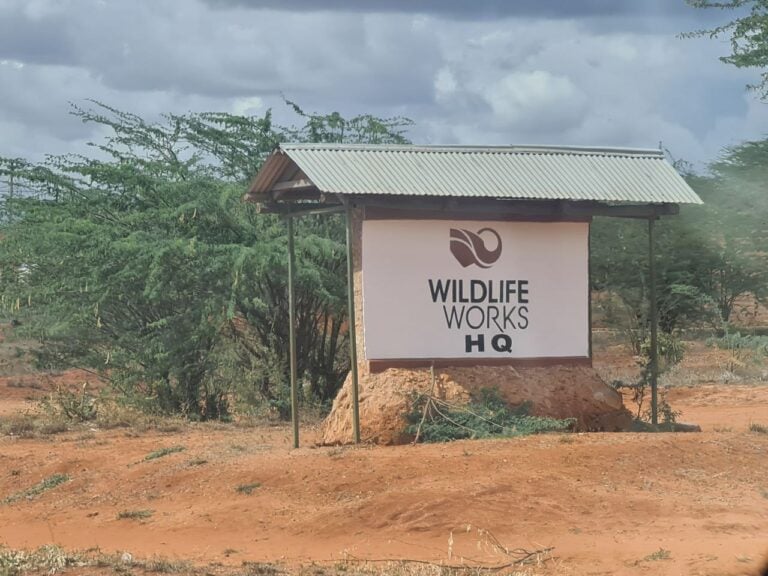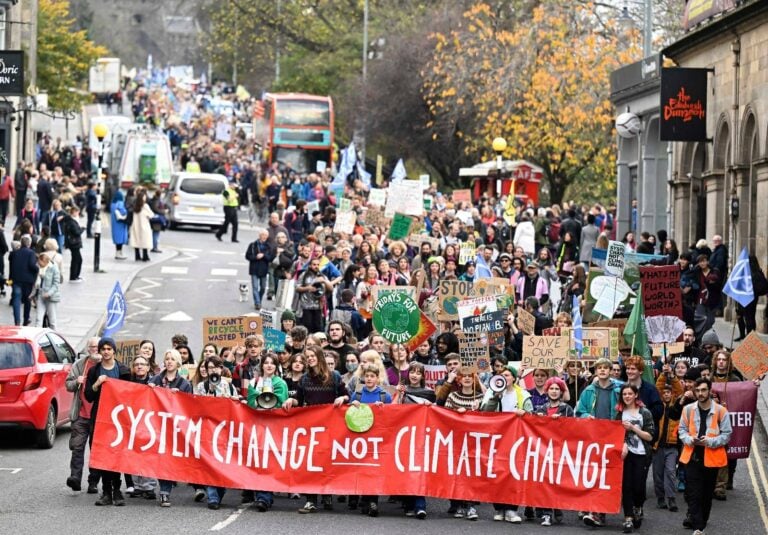The carbon offset industry needs to be abolished
In the shadow of COP28 in Dubai, SOMO joins the many voices demanding an end to carbon offsets and a greater focus on real climate action and emissions reductions.

Much of the attention at the 28th UN annual climate conference (COP 28), hosted in the United Arab Emirates (UAE), is on whether there will be an agreement on the use of carbon offsets under Article 6 of the Paris Agreement, with a particular focus on land-based carbon offsets. While many governments and companies have net-zero targets that rely on carbon offsets, a growing number of reports from civil society(opens in new window) , academia(opens in new window) , and the media(opens in new window) reveal fundamental and structural flaws underlying this industry. With the concentration of greenhouse gases at record highs, SOMO joins the many voices that demand an end to carbon offsets and a greater focus on real climate action and actual emissions reductions.
The idea underpinning carbon offsetting is that emissions in one place are “cancelled out” by projects established elsewhere that claim to be removing, reducing or avoiding equivalent emissions. This has created an industry that ‘produces’ carbon credits for sale. These credits are then bought by many other industries, from airlines to oil companies to agribusiness, as it allows them to continue and expand their operations(opens in new window) (and pollution) while claiming to be moving to net zero without having to meaningfully reduce their emissions.
Carbon offsetting is now a lucrative $2 billion industry expected to grow significantly in the coming years. This new industry includes project developers, auditors, certifiers, intermediaries, bankers, traders, speculators, and shareholders.
Ten reasons to abolish the carbon offsets industry
- Offsets delay the real work of tackling the climate crisis – and we cannot afford to do this. Carbon offsetting has enabled companies and major economies to justify “business as usual” while simultaneously claiming to transition towards “net zero” practices. After over 20 years of carbon offsetting, global emissions continue to rise. As long as the wealthiest actors, particularly those most responsible for the climate crisis – such as the fossil fuel industry – continue to be able to buy their way out of reducing their actual emissions, they will do so. Carbon offsetting, thus, is a dangerous distraction from the undeniable and urgent task at hand: drastically reducing emissions by phasing out fossil fuels.
- Offsets assume that the carbon released from fossil fuels is equivalent to the carbon absorbed by trees – which is factually wrong.
Scientists distinguish(opens in new window) between two different sources of carbon dioxide. Biotic carbon is present in living organisms and can be found above ground in the atmosphere, oceans, forests and soils. Fossil carbon, on the other hand, is the carbon locked underground for millions of years until humans extract it for oil, gas or coal. Once fossil carbon is burnt as fossil fuel, it will stay above ground(opens in new window) for a long time. The world’s vegetation, oceans, and soils can only absorb so much of this excess and certainly cannot absorb enough of it fast enough. It is thus highly problematic when industries releasing fossil carbon into the atmosphere claim to be “compensating” these emissions with projects that temporarily store carbon in trees or soil. This underlying assumption of offsets is a dangerous misconception, leading to further concentration of greenhouse gases in the atmosphere and obfuscating the fact that burning fossil carbon is driving the climate crisis. - Offsets’ carbon accounting has been discredited.
Multiple studies have demonstrated that carbon accounting, which is crucial for generating carbon credits, is flawed, unreliable and can even be considered fraudulent and a “carbon con”. When the businesses running offset projects overestimate the volume of emissions that would have been released in the absence of the project or overstate the emissions that are expected to be removed or avoided with the project, the project generates “phantom credits”: they do not represent actual emission reductions or removals. Yet, significant over-crediting is commonplace in the carbon market. This fundamentally undermines the Paris Agreement and any real - Carbon offset projects frequently lead to land grabbing and human rights abuses, primarily in the global South. The increasing global demand for offsets is leading to severe and growing problems in the areas where carbon offset projects are developed. The abuses documented include conflicts, forced relocation, weakening or undermining of local land tenure systems, violations of human rights and threats to the livelihoods of those who live on and depend on those lands. This should not be a surprise as large areas of land – and the lives of the people who live there – are being handed over to the control of a profit-seeking industry. In November 2023, SOMO and the Kenya Human Rights Commission exposed the systemic sexual abuse of women at the celebrated REDD+ Kasigau carbon offset project in Kenya, run by the US company Wildlife Works. Although rumours of these abuses had existed for a decade, they were never brought to light despite social and environmental auditors’ multiple assessments of the Kasigau project. Instead, the project was repeatedly approved under the Verra
- The offset industry’s self-set standards and certification processes encourage and enable abuse. The carbon offsetting business relies on social and environmental auditors and certifiers. These companies are paid – by the offsetting business – to assess the project’s impact on carbon and people. The business model of the auditors and certifiers depends on their clients selling (more) carbon credits. This creates an obvious conflict of interest, and there is substantial(opens in new window) and growing evidence(opens in new window) that the auditors are failing to identify serious abuses. For example, the carbon credits from the REDD+ Kasigau Project in Kenya were sold with a “premium” certification based on claims that the project supported women’s empowerment and local development. None of the audit firms that assessed Kasigau reported any allegations of sexual abuse or, indeed, any serious problems at all. Moreover, certifications that raise the price of carbon credits by “adding value” with claims of improving people’s lives and livelihoods are, in fact, turning fundamental rights into commodities.
- The offset logic reproduces a colonial construct.
Carbon offset projects reproduce colonial models(opens in new window) of control and use of land, forests and livelihoods as well as of exploitation of particular groups of people and of nature itself. By design, the industry’s main objective is to maintain business-as-usual, which already creates negative consequences, mainly on forest-dependent populations, small farmer communities and Indigenous Peoples. Most of the owners and customers of the offset industry come from the global North. They can sustain their destructive businesses and lifestyles by taking over more resources and lands from the global South. The offset industry prioritises the profits of big businesses and wealthy elites over the world’s climate stability. It is an industry that fundamentally relies on and amplifies inequality(opens in new window) . Offset projects often portray forest-dependent communities’ livelihoods as criminal or bluntly blame them for being the drivers of deforestation. These communities did not create the climate crisis, but the offsetting industry makes them pay for it(opens in new window) . Carbon offsetting is fundamentally at odds with any concept of a just transition. - Despite their failure to reduce emissions, public money is being squandered for carbon offsets.
Millions of dollars in public money are being channeled into supporting and enabling(opens in new window) the carbon market, to produce enabling legal frameworks for the industry. Most development banks(opens in new window) manage funds, especially for establishing or expanding carbon legislation, programs and projects worldwide, introducing the carbon asset into national legislation. - The offset industry perpetuates an extractivist model that plunders nature. The economic logic of constant and increasing extraction of nature’s resources and people’s labour for the accumulation of profits provoked the climate crisis in the first place. Offsets are based on the same logic. The offset industry perpetuates the dominant economic model that views nature and certain populations as mere resources to exploit and commodify.
- Offsetting commodifies the protection of nature, putting real conservation at risk.
Supporters of offsets often claim that carbon markets are the most feasible way to channel much-needed funds into conserving forests and other biodiverse ecosystems. SOMO strongly believes in protecting forests and biodiverse ecosystems. However, this should be done with full respect to the fundamental rights of the populations living within and guarding these areas. Although studies indicate(opens in new window) that land under indigenous control(opens in new window) does much better(opens in new window) than under a state or private management scheme, Indigenous Peoples are often disenfranchised by forest conservation projects, especially those linked to offsetting schemes. Protecting nature and forests must not be turned into a profit-making endeavour. Displacing indigenous populations and turning their forests into business does not protect either of them(opens in new window) – it makes them more vulnerable as people usually end up forcibly displaced, and the forests become dependent on volatile economic interests. - Offsets repeat a flawed, inequality-driving foreign direct investment model.
Most promoters of carbon markets argue that offsetting businesses will channel much-needed foreign direct investment (FDI) into developing countries. This argument ignores the evidence that FDI based on the exploitation of natural resources has seldom had an overwhelmingly positive benefit in low- and middle-income countries. On the contrary, there is abundant evidence(opens in new window) that foreign investors’ exploitation of natural resources has often been accompanied by illicit financial flows(opens in new window) , frequently connected to tax avoidance and entrenched economic inequality. For example, carbon agreements are being presented to developing countries, particularly those in financial distress, as a way to pay off their sovereign debts(opens in new window) (debt held overwhelmingly by wealthy countries and private actors in the global North). The exploitative economic framework that entrapped many global South countries in debt in the first place is now being leveraged to gain control of their land to run offsetting projects to benefit the shareholders or owners of the foreign companies. Debt relief, reparations and decolonization of the global economic system are prerequisites for investment to be non-exploitative.
While the UN climate negotiations continue, interests at stake are high. The COP’s Presidency, Sultan al-Jaber, organises multiple events(opens in new window) promoting the carbon offset industry. This should not be a surprise since he is also the CEO of UAE’s Abu Dhabi National Oil company (Adnoc), which has ambitious plans for short-term expansion in the oil and gas sectors(opens in new window) . In the last few months, the UAE-based company Blue Carbon signed agreements(opens in new window) with the governments of Kenya, Tanzania, Liberia and Zambia to develop REDD+ carbon offset projects involving millions of hectares of land in these countries – all to generate carbon credits. The Chairman of Blue Carbon is a senior member of the Royal family in Dubai and owns a portfolio of several companies operating across Africa and Asia, including oil and gas companies(opens in new window) .
For decades, SOMO has investigated multinational corporations, their shareholders, and the structures that enable this extractivist economic system. It is evident that to tackle the climate crisis meaningfully, we must tackle the “growth at all costs” mentality that underlines the current economic model. Carbon offsetting takes us in the opposite direction, giving cover to the ongoing expansion and growth of fossil fuels and being a growth profit-seeking industry in itself, both based on the exploitation of nature and people.
This is a critical moment.
The UN and wealthy government representatives must stop delaying just climate action. Instead, they must focus on phasing out fossil fuels and reducing the energy demands of their economies.
Carbon offsetting has no place in addressing the climate crisis. It has no place in genuine conservation. It has no reason to exist except to protect the interests of the wealthy. As such, it must end.
-
 Es necesario abolir la industria de compensación de carbono (pdf, 382.48 KB)
Es necesario abolir la industria de compensación de carbono (pdf, 382.48 KB)
Do you need more information?
-

Ilona Hartlief
Researcher -

Joanna Cabello
Senior Researcher
Related news
-
 Systemic sexual abuse at celebrated carbon offset project in KenyaPosted in category:News
Systemic sexual abuse at celebrated carbon offset project in KenyaPosted in category:News Maria HengeveldPublished on:
Maria HengeveldPublished on: -
 The trillion-dollar threat of climate change profiteersPosted in category:Long read
The trillion-dollar threat of climate change profiteersPosted in category:Long read Myriam Vander StichelePublished on:
Myriam Vander StichelePublished on: -
 The Counter: strengthening the fight for climate justice around the worldPosted in category:Long read
The Counter: strengthening the fight for climate justice around the worldPosted in category:Long read Luis ScungioPublished on:
Luis ScungioPublished on:



